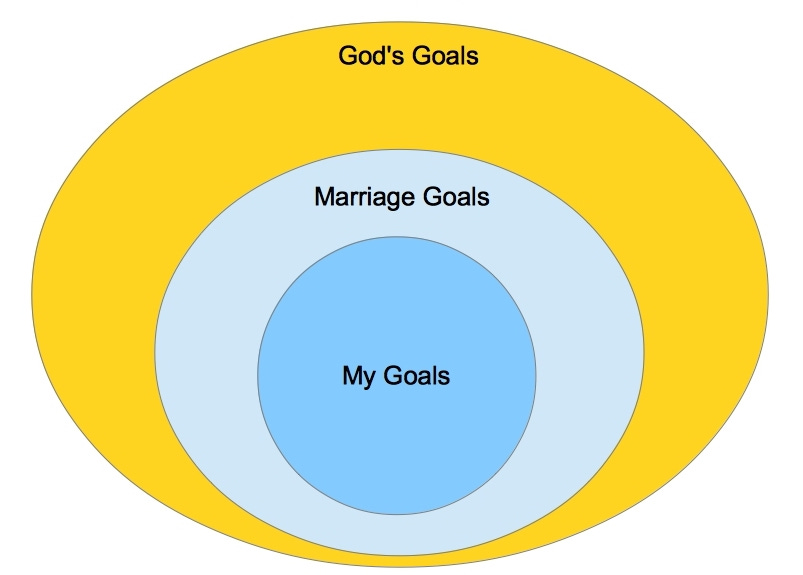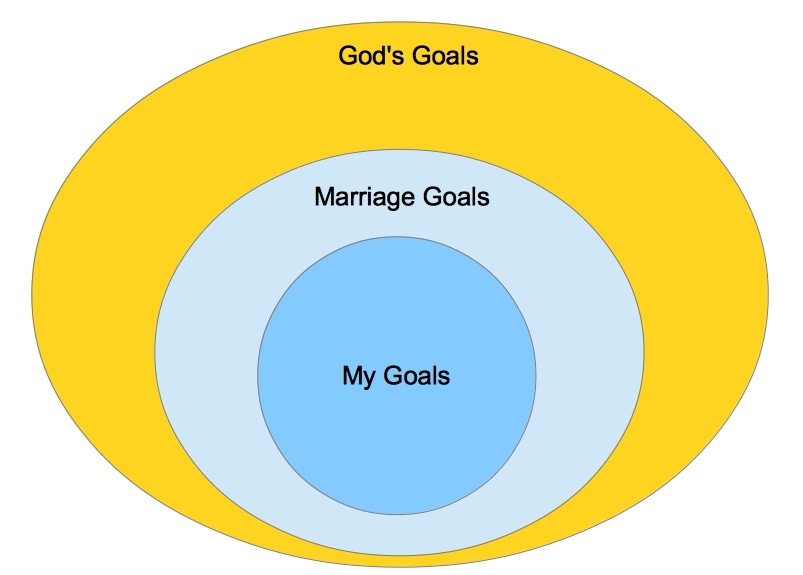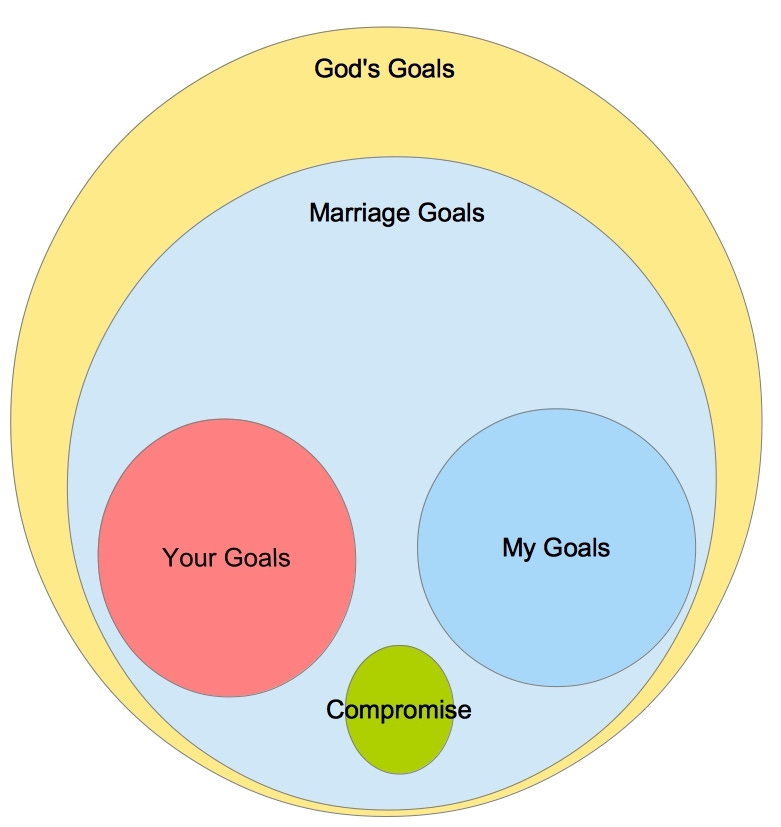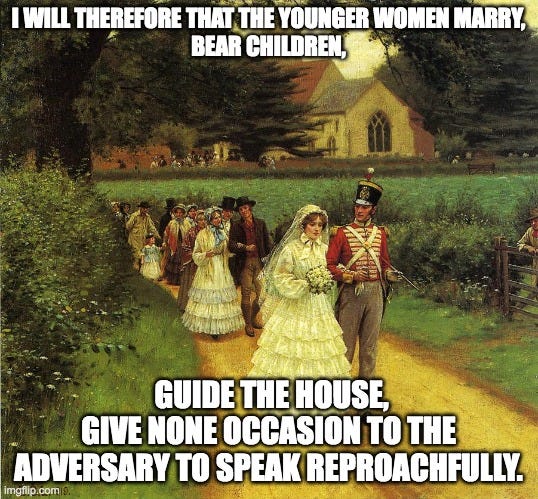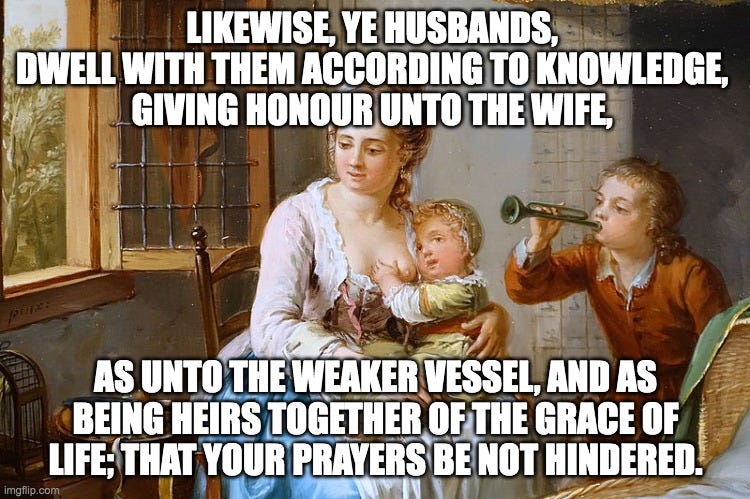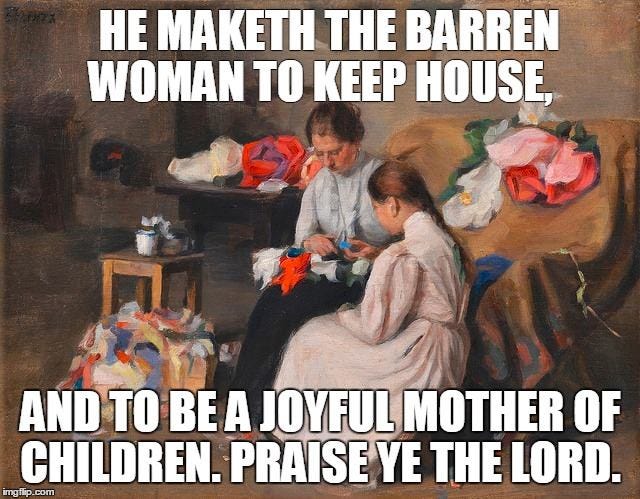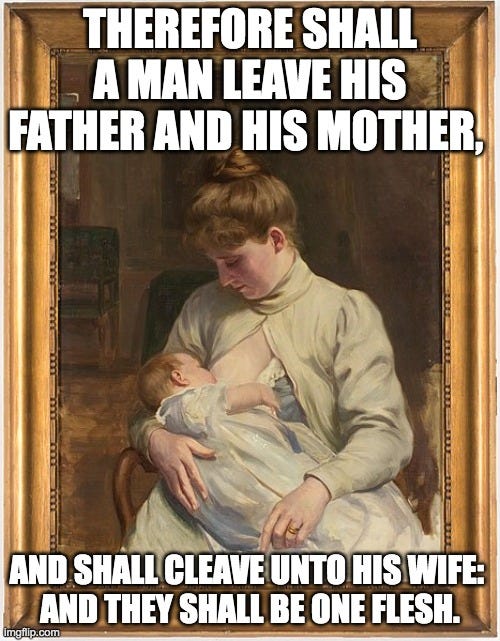There are no personal goals in marriage. If you have a personal goal, that is outside marriage. It is in contradiction to marriage. That is the truth, and I am sticking by it. It is in contradiction to much of modern thought, and I am sticking by it even more firmly. But I think there is a way in which it can be legitimately misunderstood, so I am going to clarify.
This comes, of course, from a post in my ‘What is Marriage’ letter exchange with
. In it he defends both ‘personal goals’ and ‘compromise’. Or, rather, he assumes that they exist and are good. I disagree with both.Warning: Boomer
Husbands, love your wives, even as Christ also loved the church, and gave himself for it;
That he might sanctify and cleanse it with the washing of water by the word, That he might present it to himself a glorious church, not having spot, or wrinkle, or any such thing; but that it should be holy and without blemish.
So ought men to love their wives as their own bodies.
He that loveth his wife loveth himself. For no man ever yet hated his own flesh; but nourisheth and cherisheth it, even as the Lord the church:
For we are members of his body, of his flesh, and of his bones.
Ephesians 5:25-30
I am a boomer, and suffered in government schools under various educational fads. Some of them merely awful, some of them truly horrible, all of them stupid. But, then, government schools are stupid by definition.
One of those fads was… brace yourself… set theory. And since I am a boomer, and since I had to suffer through it in school, I am now going to force set theory on my audience. I’m cruel that way.
Let me propose three things, which we will then put into sets. Or create as sets. Or whatever. These things are ‘God’s Goals’, ‘Marriage Goal’s’, and ‘Personal Goals’. Using set theory, we can represent these each as separate sets:
We can even see that some of these might overlap, thus:
Now what I am saying is that the above idea is false, and wrong. That is, it does not reflect reality and, to the extent we operate as if it is true, we do evil. This is clearly seen in Christian theology in this diagram
The way this set reads is that there are three sets of goals:
Goals that God has for me, that I don’t share or don’t like, and don’t have as my goals
Goals that I have for me that God doesn’t share, doesn’t like, and doesn’t have as His goals and
The middle area, where both God and I agree on what I should do.
Any competent theologian would recoil in horror if any so-called Christian proposed this as a good way of organising life. We are to conform our goals to what God wants for us.
Changing definitions
For of him, and through him, and to him, are all things: to whom be glory for ever. Amen.
Romans 11:36
Now what I would like to do is to change some definitions, and see if, perhaps, Andrew and I can agree. I love disagreement, I love discussions and good knock-down down drag-out arguments… but I love agreement as well, especially over vitally important truths.
Let me propose a new definition for ‘personal goals’, that fits with my set theory above and also with Christian theology. Let me propose:
There is something I want to do, which is helpful to my marriage, and honouring to God = Personal Goal
There is something we want to do, which is helpful to our marriage, and honouring to God = Marriage Goal
What this does is change the diagram to look like this:
These are the kind of ‘personal goals’ that a married Christian should have. And they don’t have to be all super spiritual. The wife who wishes to plant a rose garden might do it to provide beauty to her family and everyone around her. There’s a verse for that!
What this does is make ‘personal goals’ a subset of ‘marriage goals’, and ‘marriage goals’ a subset of ‘God’s goals’.
No Compromise
Wives, submit yourselves unto your own husbands, as unto the Lord.
For the husband is the head of the wife, even as Christ is the head of the church: and he is the saviour of the body.
Therefore as the church is subject unto Christ, so let the wives be to their own husbands in every thing.
Ephesians 5:22-24
Let me work the same thing on the word ‘compromise’. Let me state that there should be no compromise in marriage, and then redefine it.
Here is the way that compromise is typically seen. It starts with a disagreement:
You see how there is no overlap between the goals. Thus, the ‘compromise’ will fall in one of these places:
or
or
The ‘compromise’ ends up being either what I wanted, what you wanted, or what neither of us wanted. Or wanted as much.
Now let us throw the our Godly diagram back in:
and add our new additions
Is this what is meant by ‘compromise’ when moderns use it? Is the question that they are working on answering, “How can we best serve God and put our marriage first?” Is that what this ‘my goal’ fits under?
If so, where is the disagreement? Is it just a matter of trying to figure out what does serve God and our marriage best? If so, marriage has an authority structure for figuring that out.
Or is what actually meant ‘my selfish goal’? My goal that I want no matter what it does to my relationship to God or to my marriage? In which case, such a goal has no place in marriage or Godliness.
Move to Phoenix
Let thy fountain be blessed: and rejoice with the wife of thy youth.Let her be as the loving hind and pleasant roe;
let her breasts satisfy thee at all times; and be thou ravished always with her love.
Proverbs 5:18-19
Suppose the wife were to come in one day and say,
“I’ve decided I’m moving to Phoenix. I’ll get myself a little apartment and fly back every couple of months.”
“What?!”
“I’ve got this great job offer, and so going will really work out well for my personal goals.”
This is not hyperbole. This kind of thing, in hundreds of permutations, happens every day. If this is what is meant by ‘personal goals’ then ‘personal goals’ have zero place in any marriage, let alone a Christian marriage.
Now suppose instead she had said,
“When we were at the nursing home the other day, I met a young woman with a fatal disease who was just admitted. I would like to visit her, as she’s feeling very alienated from her family.”
That is what a ‘personal goal’ should look like in a Christian marriage or any marriage.
And, no, the difference isn’t just one of ‘doing good’. The husband could have come home with a statement about something at work where, in his opinion, his making a change would be honouring to God and helpful to his family. The wife could have seen a washing machine she thinks they should buy. The oldest daughter might be proposing to babysit the neighbors’s children.
Ice Cream
Or are we talking about ice cream? Does the husband like chocolate, the wife likes vanilla, the oldest son likes Rocky Road… and so they buy Neapolitan? If so, then this is both trivial, and a misunderstanding.
It is literally the job of the leader of an organisation (in this case the father) to see what he can do to ‘please’ the people under his authority. Chocolate ice cream is not like coming to worship time. But the word ‘compromise’ is still not helpful here. The father can decide what ice cream they will get, and a Godly and loving father will make that decision with the good of those under his authority in mind.
Or the father can delegate this decision to someone under his authority… the wife as the manager of his household or his son as the person he sent to the store. And that person, too, should, in a Godly way, take into account what will please the various people he is acting for.
They might pick some ice cream that everyone likes, even if it isn’t the favourite, or they might get chocolate because it is the father’s birthday, or vanilla because they got Rocky Road last time, and besides, they have toppings. But this is a decision, made in good faith, by the person authorised to make the decision.
Conclusion
Every act in a Godly marriage should be done in service to God and the marriage to glorify God and love the spouse and children. In light of that, we have no personal goals. But every act in a Godly marriage happens by the initiative of one or more of the members of the marriage and family. In that sense, these acts and the goals behind them are ‘personal’. The wife personally decides to bake cookies for her family.
But these goals must not be ‘personal’ in their focus. All goals in the family, as in all goals in the church, must be ‘corporate’. The individual thinks, the individual decides, and the individual acts… but the ‘goal’ of those actions, decisions, and thoughts should be corporate.
The father has the responsibility both to make decisions and to delegate them. These decisions should be made for the good of all involved, no matter who makes them. I don’t think the word ‘compromise’ accurately reflects that.
Likewise, ye wives, be in subjection to your own husbands;
that, if any obey not the word, they also may without the word be won by the conversation of the wives; While they behold your chaste conversation coupled with fear.
Whose adorning let it not be that outward adorning of plaiting the hair, and of wearing of gold, or of putting on of apparel; But let it be the hidden man of the heart, in that which is not corruptible, even the ornament of a meek and quiet spirit, which is in the sight of God of great price.
For after this manner in the old time the holy women also, who trusted in God, adorned themselves, being in subjection unto their own husbands: Even as Sara obeyed Abraham, calling him lord: whose daughters ye are, as long as ye do well, and are not afraid with any amazement.
I Peter 3:1-7
Thank you for reading Von’s Substack. I would love it if you commented! I love hearing from readers, especially critical comments. I would love to start more letter exchanges, so if there’s a subject you’re interested in, get writing and tag me!
Being ‘restacked’ and mentioned in ‘notes’ is very important for lesser-known stacks so… feel free! I’m semi-retired and write as a ministry (and for fun) so you don’t need to feel guilty you aren’t paying for anything, but if you enjoy my writing (even if you dramatically disagree with it), then restack, please! Or mention me in one of your own posts.
If I don’t write you back it is almost certain that I didn’t see it, so please feel free to comment and link to your post. Or if you just think I would be interested in your post!
Thanks again, God Bless, Soli Deo gloria,
Von
Links
Links
What Is Marriage #1A
·
JUNE 27, 2023
What is Marriage #1B
·
JUNE 29, 2023
What is Marriage #2A
·
JULY 4, 2023
What is Marriage? 2B (or not 2b, I suppose)
·
JULY 6, 2023
What is Marriage? 3A
·
JULY 11, 2023
What is Marriage #3B
·
JULY 13, 2023
What is Marriage #4A
·
JULY 19, 2023
What is Marriage #4B
·
JULY 21, 2023
What Is Marriage #5A
·
JULY 25, 2023
What is Marriage #5B
·
JULY 27, 2023
What Is Marriage #6A
·
AUGUST 2, 2023
What is Marriage #6B
·
AUGUST 4, 2023
What Is Marriage #7A
·
AUGUST 9, 2023
What is Marriage #7B
·
AUGUST 17, 2023
What is Marriage 8B: Discussing Dichotomies
What is marriage? What is modern marriage? What is my marriage, or your marriage, or the marriage in deepest Brazil? What is man, and what is woman? Why are we here, and to Whom are we accountable? Andrew has written his latest post in our ‘marriage’ exchange, and in it he takes us back to the beginning of the discussion. Asking questions about the very …









